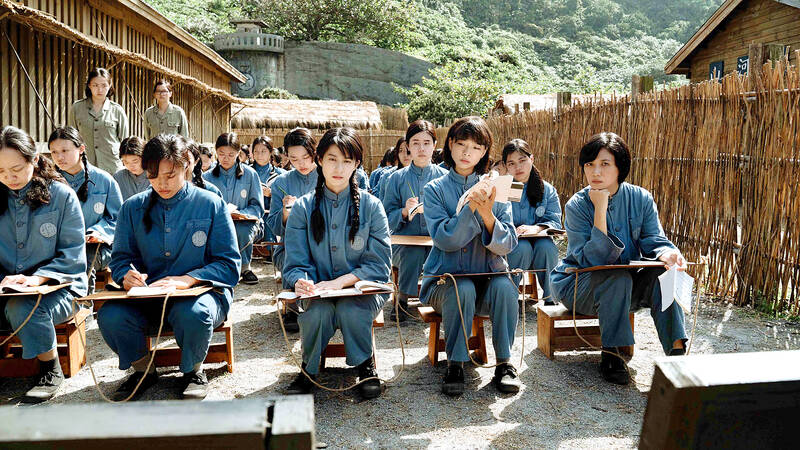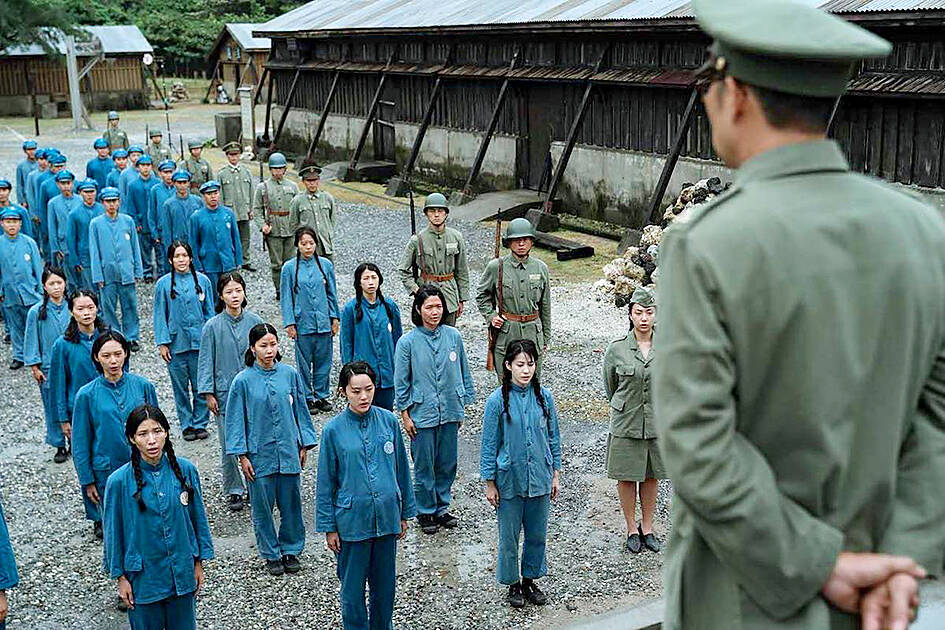Having read the book featuring the true stories Untold Herstory (流麻溝十五號) draws from, it was interesting to see how director Zero Chou (周美玲) took bits and pieces of these experiences and weaved them into a dramatic narrative.
While there’s been much effort in recent decades to highlight the long-suppressed history of the thousands of political prisoners once confined on Green Island (then-known as Bonfire Island, 火燒島), an often-forgotten part is the nearly 100 female prisoners who toiled there. Mostly imprisoned in gated barracks, they were only let out to attend “re-education” classes and perform hard labor.
Many of them were still students, suddenly nabbed and dragged away during the height of White Terror for innocuous offenses such as reading banned books, saying something that may be interpreted as pro-communist or simply knowing the wrong people. Some were reported by people they had offended as a form of revenge. Records show that 26 women were executed for their “crimes,” but the actual number is likely higher.

Photo courtesy of Activator Marketing Co
It was taboo to discuss the issue for decades, especially as those released still faced social stigma and government surveillance. Many refused to talk about it even after the lifting of martial law. Fortunately, five of them opened up to Tsao Chin-jung (曹欽榮) for the book, providing an invaluable glimpse of the horrors and hardships they witnessed and endured. Tsao, who has been researching the White Terror for decades and led the planning for the Green Island White Terror Memorial Park and other projects, served as consultant to the film.
Shot delicately in muted, cool tones, the attention to detail in the film is impressive, from the painstakingly reconstructed camps and barracks, to the costuming, to the varying, heavy accents of the prisoners and guards. The Chinese Nationalist Party (KMT) guards came here from all across China, while the Taiwanese were just beginning to learn Mandarin — this, in addition to the terminology they use, is handled very well.
Three fictional protagonists were created for the story: the young and innocent Kyoko (Yu Pei-jen, 余佩真) who sketches everything she sees, the wistful dancer Chen Ping (Cindy Lien, 連俞涵), who catches the eye of the top commander and Yen Shui-hsia (Herb Hsu, 徐麗雯), a strong-willed Christian mother and nurse who refuses to bow down to authorities. Chen is one of hundreds of students from China’s Shandong Province accused of sedition in the 713 Penghu Incident, and it’s important to highlight that those from China (“mainlanders”) were also subject to White Terror abuse.

Photo courtesy of Activator Marketing Co
One can roughly tell which women from the book they’re based on, but they’re distinct enough and draw from a multitude of accounts. There were never more than 100 women incarcerated on Green Island at a time, but the prisoners’ assigned numbers in the film were all in the 100s. Chou says in an interview that this is done purposely to avoid revealing the names of the political prisoners.
The central event of the film is the “Save the Nation with Good Conscience Movement” (一人一事良心救國運動), which included pledges “volunteering” to tattoo anti-communist slogans on their body. The mass refusal to participate eventually culminated in the “re-rebellion” case (再叛亂), where 14 people were executed.
As a mainstream feature film, the overall story and events are a bit melodramatic, but that’s what pleases movie-goers and helps bring more attention to this forgotten history. The historical elements are presented well and are smoothly incorporated into the narrative, and it helps that they come from detailed oral accounts that include the emotions the subjects felt during certain events. The general political atmosphere of the times is also reflected through the newspaper clippings the prisoners secretly save as well as conversations between those who run the prison.
Despite the state’s attempts to dehumanize and brainwash the prisoners, the film emphasizes their interactions, camaraderie and humanity as they each try to retain their sanity and dignity in different ways.
Overall, it’s a powerful statement and ode to these women and their will to endure the most difficult situations. Two of the women in the book spent more than 12 years locked up on bogus charges, but there was nothing they could do but carry on with life after getting out. If you can read Chinese, definitely pick up the book after watching the film.

Jacques Poissant’s suffering stopped the day he asked his daughter if it would be “cowardly to ask to be helped to die.” The retired Canadian insurance adviser was 93, and “was wasting away” after a long battle with prostate cancer. “He no longer had any zest for life,” Josee Poissant said. Last year her mother made the same choice at 96 when she realized she would not be getting out of hospital. She died surrounded by her children and their partners listening to the music she loved. “She was at peace. She sang until she went to sleep.” Josee Poissant remembers it as a beautiful

March 2 to March 8 Gunfire rang out along the shore of the frontline island of Lieyu (烈嶼) on a foggy afternoon on March 7, 1987. By the time it was over, about 20 unarmed Vietnamese refugees — men, women, elderly and children — were dead. They were hastily buried, followed by decades of silence. Months later, opposition politicians and journalists tried to uncover what had happened, but conflicting accounts only deepened the confusion. One version suggested that government troops had mistakenly killed their own operatives attempting to return home from Vietnam. The military maintained that the

Before the last section of the round-the-island railway was electrified, one old blue train still chugged back and forth between Pingtung County’s Fangliao (枋寮) and Taitung (台東) stations once a day. It was so slow, was so hot (it had no air conditioning) and covered such a short distance, that the low fare still failed to attract many riders. This relic of the past was finally retired when the South Link Line was fully electrified on Dec. 23, 2020. A wave of nostalgia surrounded the termination of the Ordinary Train service, as these train carriages had been in use for decades

Lori Sepich smoked for years and sometimes skipped taking her blood pressure medicine. But she never thought she’d have a heart attack. The possibility “just wasn’t registering with me,” said the 64-year-old from Memphis, Tennessee, who suffered two of them 13 years apart. She’s far from alone. More than 60 million women in the US live with cardiovascular disease, which includes heart disease as well as stroke, heart failure and atrial fibrillation. And despite the myth that heart attacks mostly strike men, women are vulnerable too. Overall in the US, 1 in 5 women dies of cardiovascular disease each year, 37,000 of them